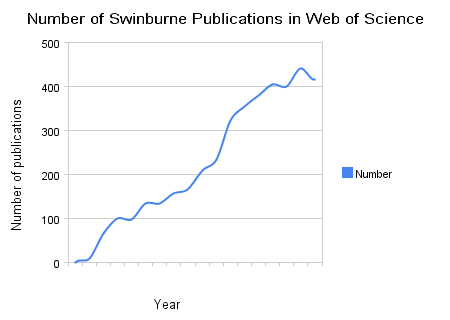As directed by 23 Things task 14, I had a bit of a play with Google Docs this afternoon.
I’ve never really felt the need to use a web-based office suite before; the two places I am most likely to use a word processor, at work and at home, I have access to Microsoft Office. And while it’s hardly perfect (and very expensive if you’re a Mac user … which I used to be), it’s the standard and no-one seems to have written anything good enough to replace it yet (I’m sure I’m not the only one who finds OpenOffice a chore).
A recent US study of 600 PC users found that 73 percent of the respondents had never heard of Google Docs, and 94 percent had never tried a web-based productivity suite at all. I wasn’t surprised that so few people had used an online word processor; there are many perfectly valid reasons for refraining. Along with those who see no place in their lives for an online suite, there are also those (understandably) concerned with the overwhelming problem of privacy when storing anything online, especially with Google (Dana discusses this far more eloquently than I could). As Adam Ostrow at Mashable notes, companies will be reluctant to allow their private business to be shared on Google Docs until their doubts over who owns and has access to posted content can be assuaged.
I was, however, surprised that so few of the people surveyed had heard of Google Docs. Perhaps it is because there are a number of rival online office suites available, most notably Zoho, ThinkFree and now Buzzword (a new flash-based Adobe product). MakeUseOf.com is not alone in preferring Zoho to all the others. Interestingly, the results of a Lifehacker user poll suggest that users sometimes swing towards Google Docs because they already having a Google account, even though Zoho provides a number of extra features.
While I’m sure it adequately serves its purpose, personally I’m uninspired by Google Docs — it doesn’t seem to offer me anything new. Sure, it allows me to edit documents in HTML or WYSIWYG mode, but so do WordPress and Blogger. I was interested to see that at least one person is writing a book in Google Docs, but since my best writing ideas usually come when I’m not in front of my computer, that’s not a valid reason for me to convert from Microsoft to Google (a bit like the choice between Liberal and ALP these days …)
That said, I really like the Google spreadsheet function. I’ve never enjoyed using Excel as much as the rudimentary spreadsheet bundled in AppleWorks on my old iBook. One of my chief complaints with Excel is that I believe a frequently-used function like Sort should have a keyboard shortcut, as it did in AppleWorks (sadly discontinued), or at least not be part of a multi-step process. I was pleased to see that Google’s spreadsheet remedies this problem — users simply click on a horizontal bar above the second row to sort in chronological or reverse chronological order.
The Google charts are quite attractive too (these are some metrics statistics I’ve been monitoring for a little while now):
There may not be as many formatting choices as there are in Excel, but the results are neat, precise and professional. Given the quality of the spreadsheeting software, I’m hardly surprised that Google Docs spreadsheets have proved slightly more popular than the word processor. And why not, when they can help you improve your (chess) game?
Despite its potential usefulness to Swinburne Library staff, the presentation feature recently added to Google’s online office suite is not covered in the 23 Things tasks. I had a look at it anyway. Users can create an entirely new presentation or upload slides from an existing (Microsoft) Powerpoint file. It’s easy to publish presentations online (although these are naturally hosted by Google and therefore subject to those eternal questions about privacy) or to embed them in a blog as a slideshow — again, provided one uses Blogger and not WordPress. Since I unfortunately can’t show you here, for help publishing a Google presentation on your website, I recommend consulting this post from trusty technology advice blog Lifehacker.
- Google Docs in plain English video
- Mashable : Google Presentations vs Microsoft Powerpoint
- If you like Google Docs and want to use them regularly with Firefox, try this extension
- Lifehacker : Add dictionary, thesaurus and encylopaedia functionality to Google Docs
- CNET : Google Docs goes mobile
- CNET : Office Live Workspace (almost) brings Office 2007 online
* ‘Anybody who wants the presidency so much that he’ll spend two years organizing and campaigning for it is not to be trusted with the office.’
– David Broder.




 Posted by libodyssey
Posted by libodyssey 
